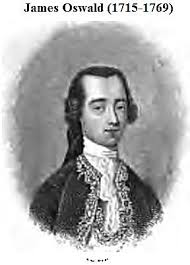Annotation:Banks of Forth (The): Difference between revisions
(Created page with "=='''Back to [[{{BASEPAGENAME}}]]'''== ---- <p><font face="garamond, serif" size="4"> '''BANKS OF FORTH, THE.''' Scottish, Air (whole time). D Major. Standard tuning (fiddle)....") |
m (Text replacement - "garamond, serif" to "sans-serif") |
||
| (5 intermediate revisions by one other user not shown) | |||
| Line 1: | Line 1: | ||
=='''Back to [[{{BASEPAGENAME}}]]'''== | =='''Back to [[{{BASEPAGENAME}}]]'''== | ||
---- | ---- | ||
<p><font face=" | <p><font face="sans-serif" size="4"> | ||
'''BANKS OF FORTH, THE.''' Scottish, Air (whole time). D Major. Standard tuning (fiddle). AB. Composed by James Oswald (). | '''BANKS OF FORTH, THE.''' Scottish, Air (whole time). D Major. Standard tuning (fiddle). AB. Composed by James Oswald [https://en.wikipedia.org/wiki/James_Oswald_(composer)] (1710-1769).[[File:oswald.jpg|400px|thumb|right|]] | ||
The tune was used for a song in Johnson's '''Scots Musical Museum,''' beginning "Ye Sylvan powers that rule the plains," several stanzas of which appeared in Herd's collection and Yair's '''Charmer''' (1749), by an anonymous author. According to Stenhouse, another tune in Herd's volume may have been the original words to which the air had been adapted, also anonymously written: | |||
<blockquote> | |||
Banks of Forth<br> | |||
<br> | <br> | ||
''Awake, my love, with genial ray,''<br> | |||
''The sun returning glads the day;''<br> | |||
''Awake, the balmy zephyr blows,''<br> | |||
''The hawthorn blooms, the daisy glows,''<br> | |||
''The trees retain their verdant pride,''<br> | |||
''The turtle woos his tender bride,''<br> | |||
''To love each warbler tunes the song,''<br> | |||
''And Forth in dimples glides along.''<br> | |||
</blockquote> | |||
<br> | <br> | ||
</font></p> | </font></p> | ||
<p><font face=" | <p><font face="sans-serif" size="4"> | ||
''Source for notated version'': | ''Source for notated version'': | ||
<br> | <br> | ||
<br> | <br> | ||
</font></p> | </font></p> | ||
<p><font face=" | <p><font face="sans-serif" size="4"> | ||
''Printed sources'': Manson ('''Hamilton's Universal Tune Book, vol. 2'''), 1846; p. Oswald ('''Caledonian Pocket Companion, vol. 1'''), 1760; p. 26. | ''Printed sources'': Manson ('''Hamilton's Universal Tune Book, vol. 2'''), 1846; p. 10. J. Murray Neil ('''The Scots Fiddle, Vol. 2: Tunes, Tales & Traditions of the Lothians'''), 2013. Oswald ('''Curious Collection of Scots Tunes'''), 1740. Oswald ('''Caledonian Pocket Companion, vol. 1'''), 1760; p. 26. | ||
<br> | <br> | ||
<br> | <br> | ||
</font></p> | </font></p> | ||
<p><font face=" | <p><font face="sans-serif" size="4"> | ||
''Recorded sources'': <font color=teal></font> | ''Recorded sources'': <font color=teal></font> | ||
</font></p> | </font></p> | ||
Latest revision as of 11:05, 6 May 2019
Back to Banks of Forth (The)
BANKS OF FORTH, THE. Scottish, Air (whole time). D Major. Standard tuning (fiddle). AB. Composed by James Oswald [1] (1710-1769).

The tune was used for a song in Johnson's Scots Musical Museum, beginning "Ye Sylvan powers that rule the plains," several stanzas of which appeared in Herd's collection and Yair's Charmer (1749), by an anonymous author. According to Stenhouse, another tune in Herd's volume may have been the original words to which the air had been adapted, also anonymously written:
Banks of Forth
Awake, my love, with genial ray,
The sun returning glads the day;
Awake, the balmy zephyr blows,
The hawthorn blooms, the daisy glows,
The trees retain their verdant pride,
The turtle woos his tender bride,
To love each warbler tunes the song,
And Forth in dimples glides along.
Source for notated version:
Printed sources: Manson (Hamilton's Universal Tune Book, vol. 2), 1846; p. 10. J. Murray Neil (The Scots Fiddle, Vol. 2: Tunes, Tales & Traditions of the Lothians), 2013. Oswald (Curious Collection of Scots Tunes), 1740. Oswald (Caledonian Pocket Companion, vol. 1), 1760; p. 26.
Recorded sources:
